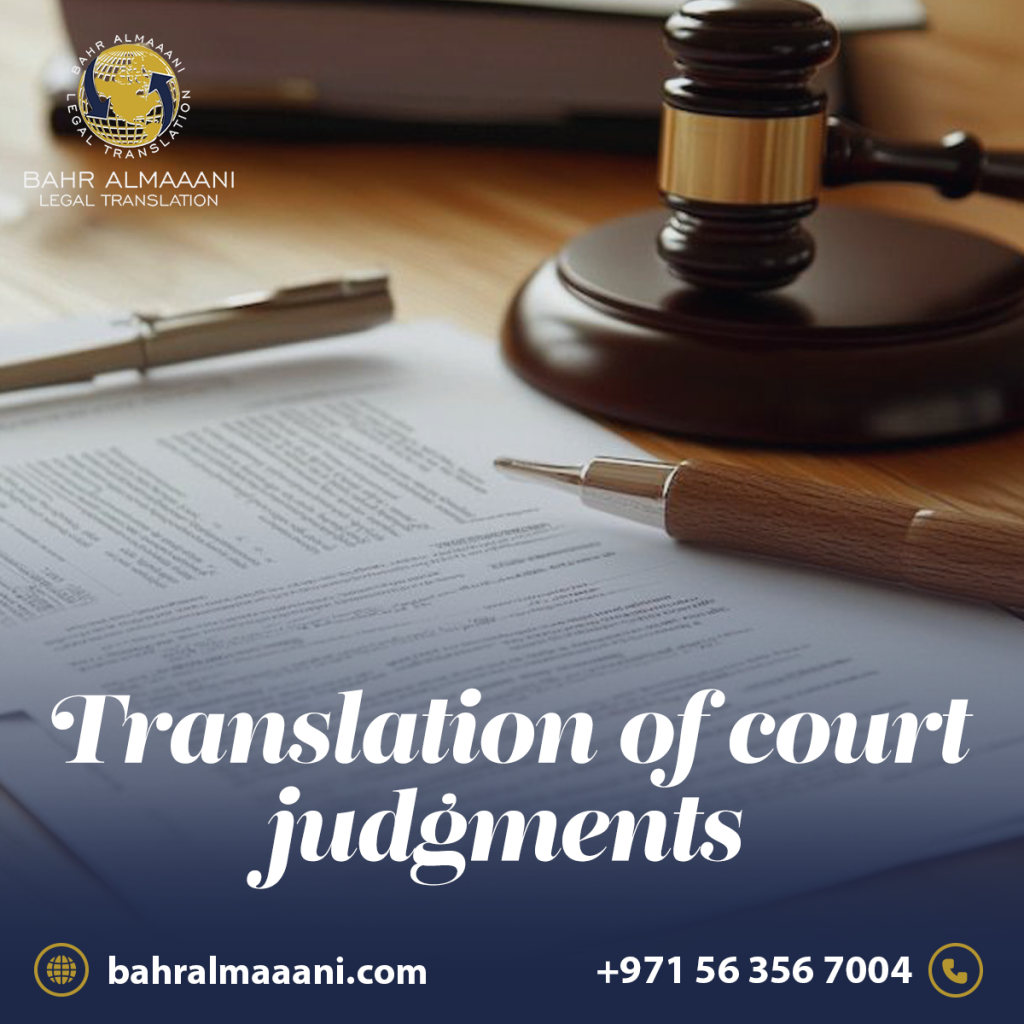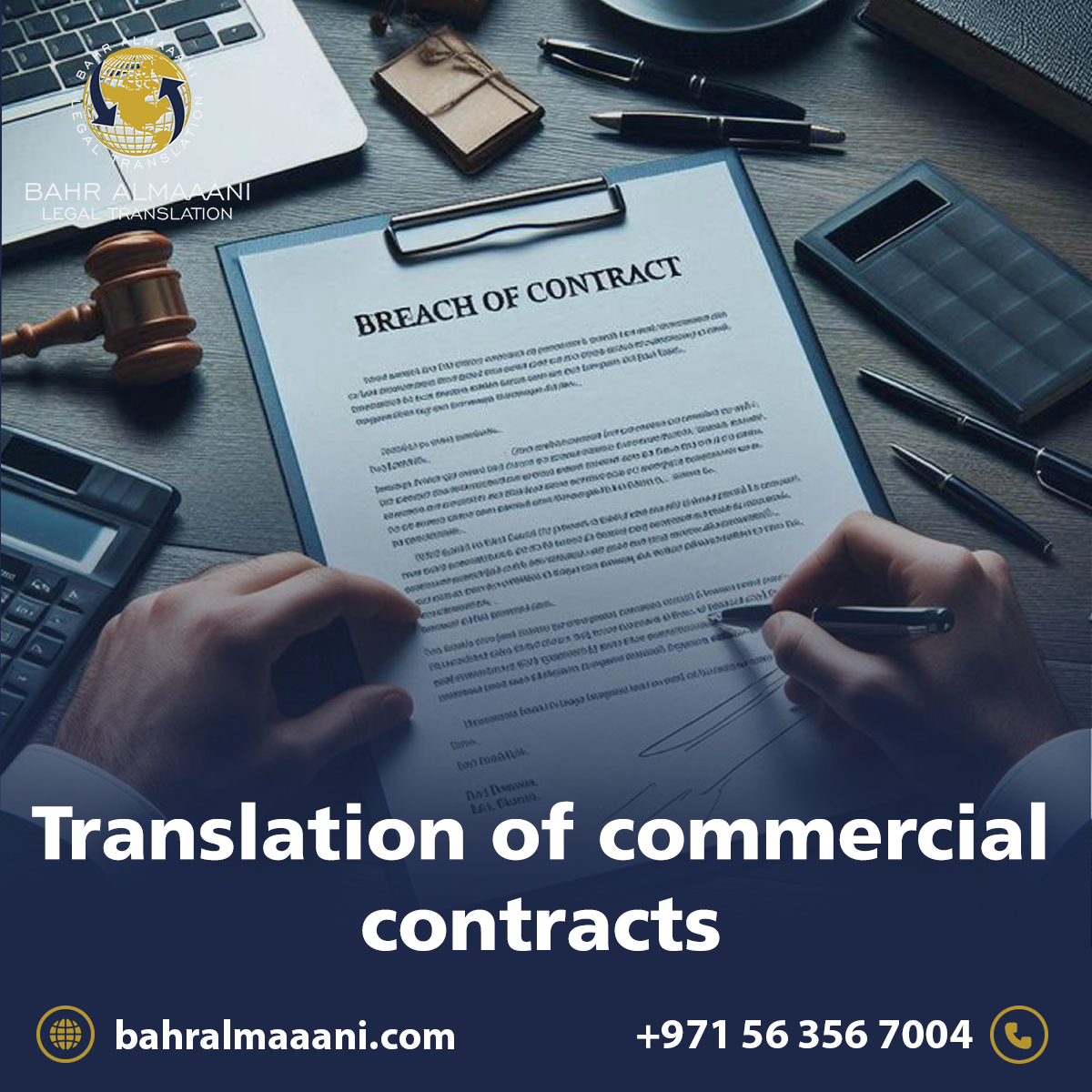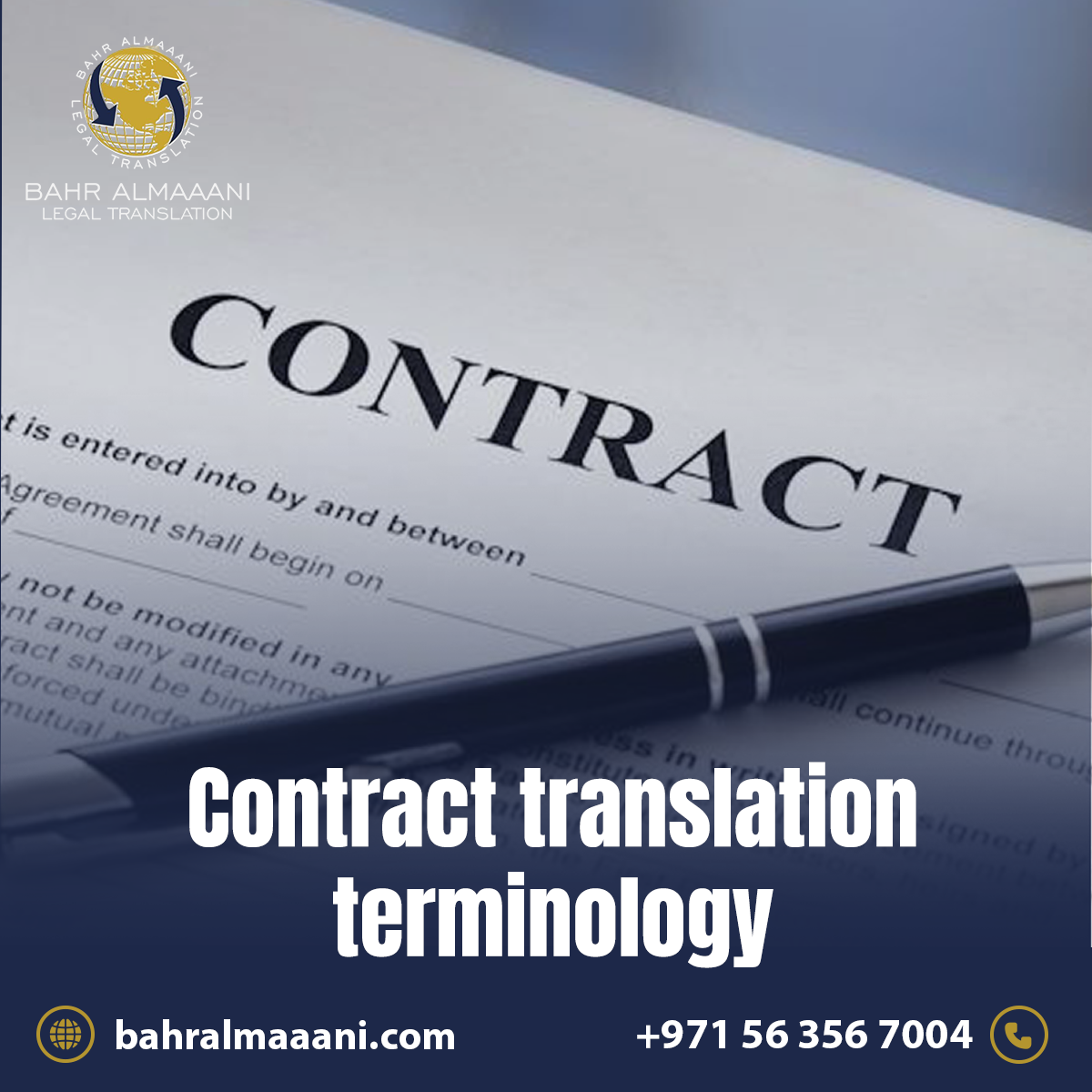
At BAHR ALMAAANI LEGAL TRANSLATION, translating court judgments is approached with exceptional precision to ensure that every legal term and concept is accurately conveyed while preserving the intended legal meaning in each paragraph.
The office relies on highly skilled legal translators with extensive expertise in both language and judicial concepts. Each judgment is thoroughly analyzed to fully comprehend the legal context before the translation process begins.
To maintain consistency and accuracy, the office also utilizes authoritative legal references and trusted sources, ensuring that terminology is standardized and eliminating any potential ambiguity that could impact the understanding or official recognition of the judgment.
This meticulous methodology guarantees a professional, legally sound translation that faithfully preserves the original legal meaning and is officially accepted by judicial authorities without the need for modifications.
Why Court Judgment Translation Requires Exceptional Legal Accuracy
Translating court judgments demands exceptional legal precision because these texts carry direct legal consequences that can affect the outcomes of lawsuits and the rights of individuals.
● First, court judgments contain precise terms and legal concepts that must be rendered carefully and accurately, without altering their meaning or legal interpretation.
● Second, even a minor translation error can lead to misunderstanding or misinterpretation of the judgment before the relevant authorities.
● Third, these translations require adherence to a formal style consistent with judicial language and the legal systems in place.
For this reason, specialized authorities insist that court judgments be translated exclusively by certified legal translators who have extensive experience in judicial drafting, ensuring that every word is accurate and the text is fully reliable before the courts.
What is the importance of Legal Expertise in Producing Certified Court Judgment Translations?
Legal expertise has a pivotal role in producing accurate and professional certified translations of court judgments. Mastery of language alone is not sufficient; a deep understanding of the legal context and nuances of judicial texts is essential.
- First, legal expertise enables the translator to accurately interpret complex terminology and relate it to the correct legal context without altering the substance of the judgment.
- Second, it helps distinguish between similar concepts that carry different legal implications, protecting the translation from any ambiguity or error.
- Third, it ensures that the translator chooses phrasing that aligns with the formal judicial language, making the translation officially recognized by courts and legal authorities.
Therefore, legal expertise is the cornerstone of successful certified court judgment translation, providing the document with the authority, accuracy, and reliability required by courts and legal institutions.
What is the Role of a Legal Translator in Interpreting Terminology During Court Judgment Translation?
A legal translator plays a critical role in interpreting terminology when translating court judgments. The translator does more than provide a literal translation; they ensure that the precise legal meaning is conveyed, reflecting the essence of the original text.
- Contextual Analysis of Legal Terms: The translator carefully analyzes legal terminology within its judicial context to accurately understand its intended meaning before starting the translation process.
- Use of Authoritative Legal References: Certified legal references are consulted to ensure the translation aligns with the legal system of the country where the text will be used.
- Balancing Clarity and Legal Accuracy: The translator maintains a balance between linguistic clarity and legal precision, ensuring the translation is easily understood without compromising the original meaning of the judgment.
Due to this specialized role, a court judgment translation gains high credibility, making it fully accepted by judicial authorities and official authorities without the need for any amendments.
How Certified Court Judgment Translation Facilitates the Enforcement of Judgments?
Certified court judgment translations play a crucial role in facilitating the enforcement of judicial decisions, whether domestically or internationally, by ensuring the legal text is clear to all related parties.
- First, such translations allow enforcement authorities to understand the details of the judgment accurately, accelerating execution procedures without errors or delays.
- Second, they help foreign parties or non-Arabic speakers comprehend the legal content of the judgment and take the required procedures according to its provisions.
- Third, a certified translation is an officially recognized document before legal authorities, giving it evidentiary value that enables the lawful and proper enforcement of judgments.
Through this combination of precision and official certification, a court judgment translation from BAHR ALMAAANI LEGAL TRANSLATION ensures that judicial decisions are efficiently and reliably carried from drafting to practical implementation.
How BAHR ALMAAANI LEGAL TRANSLATION Reviews Every Detail of Court Judgment Translations Before Delivery?
BAHR ALMAAANI LEGAL TRANSLATION places the utmost importance on reviewing every detail of a court judgment translation before delivery, as the accuracy of the judgment depends on the precision of every word and legal formulation. The office follows a multi-stage review system that ensures the highest standards of quality and official certification.
- First, the process begins with a comprehensive linguistic review to ensure the correctness of sentences and consistency of terminology with the accepted legal language, with careful verification of each term to ensure it reflects the original meaning within its proper judicial context.
- Second, the translation is reviewed by legal experts, who compare it with the original text clause by clause. This step identifies any discrepancies or ambiguities that could alter the legal meaning, which are then precisely corrected before final certification.
- Third, the document undergoes a formal and procedural review, including paragraph formatting, clarity of numbering, and completion of all data required for official certification, with the addition of the office’s authorized seal and signature.
Thanks to this methodical approach and meticulous review, Bahr Al Ma’ani ensures that every court judgment translation it produces is reliable, clear, and fully compliant with the requirements of judicial and administrative authorities in the UAE and abroad.
In conclusion, translating court judgments is not a simple linguistic task; it is a highly precise process requiring legal expertise and a deep understanding of judicial texts to convey the correct meaning without error.
With BAHR ALMAAANI LEGAL TRANSLATION’s commitment to the highest standards of accuracy and specialized review, the translation becomes a trusted tool that enables lawyers, companies, and individuals to have their judgments officially recognized and enforced smoothly before authorities in the UAE and internationally, enhancing confidence in the quality and legal accuracy of the work.
Frequently Asked Questions
1. What is court judgment translation?
It is the official and precise translation of judgments issued by courts, carried out by certified legal translators to ensure compliance with both legal and linguistic standards.
2. Why is court judgment translation important?
It enables non-native speakers of the judgment’s language to accurately understand judicial decisions and is an essential requirement for submitting judgment to judicial or enforcement authorities in other countries.
3. Who is authorized to perform court judgment translation?
Only certified legal translators accredited by official authorities such as the Ministry of Justice or recognized offices in Dubai, including BAHR ALMAAANI LEGAL TRANSLATION.
4. Can a non-certified court judgment translation be accepted?
No. Judicial and governmental authorities only recognize certified translations that are officially sealed by an accredited legal translation office.
5. What steps does a translator follow in translating court judgments?
The process includes careful reading of the judgment, understanding its legal context, translating the text in a formal style, and reviewing it linguistically and legally before certification.
6. Does court judgment translation differ between countries?
Yes. It varies according to each country’s legal system, which is why translations must be done by specialists familiar with the legal differences between jurisdictions.
7. How long does it take to translate a court judgment?
The timeframe depends on the length of the judgment and complexity of the terminology, but professional offices commit to delivering translations promptly without compromising accuracy.
8. Can court judgment translations be used at embassies or outside the UAE?
Yes. As long as the translation is officially certified and sealed by an accredited legal translation office, it can be recognized by embassies and foreign authorities.
9. Does the office maintain confidentiality of judgments during translation?
Absolutely. Legal translation offices like BAHR ALMAAANI LEGAL TRANSLATION adhere to the highest standards of confidentiality in handling all judicial documents.
10. Is it possible to obtain an electronic copy of a court judgment translation?
Yes. Accredited offices can provide a digitally certified electronic copy alongside the official paper version to facilitate


